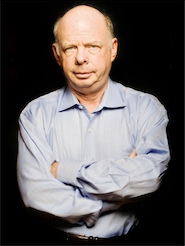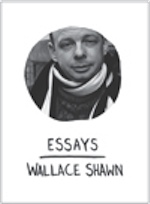Obie Award–winning playwright and actor Wallace Shawn has just published a new book–a collection of articles and interviews entitled Essays. Suffused with Shawn’s signature irony and an inimitable style that builds from observations of the everyday to issues of politics, drama, and philosophy, Essays concludes with a fascinating piece on writing about sex, which Harper’s excerpted in the August issue–marking the third time a work by Shawn has been selected for the magazine’s “Readings” section. I put six questions to Shawn about his new book.
1. In your opening piece, “The Quest for Superiority,” you write, “My feeling of superiority, and the sense of well-being that comes from that, increases with the number of poor people on the planet whose lives are dominated by me or my proxies and whom I nonetheless can completely ignore.” Where does the quest for superiority diverge from the quest for happiness?

The drive for dominance, for a higher place in a hierarchy, is undoubtedly a much-consulted chapter in the lengthy encyclopedia which we call our genetic code. Who knows–it might be the chapter that will cause our particular species to shut down the history of our planet for good. But everything depends on how this piece of our machinery, this drive for superiority, is trained, is shaped, is used. A game of chess played in a pleasant park on a summer day seems rather benign, a beauty contest somewhat less so, with a genocidal war representing the ultimate cancerous development of the same impulse. I’m rather dubious about whether the drive for a higher rank is connected to the drive for happiness at all, in humans or in any other animal species. Does a queen bee have more fun than a drone? Her life sounds nicer to us, but she might not see it that way. I suppose in my book I keep trying to suggest that the world might have been better off if Dick Cheney had been more involved in the pursuit of happiness, if he’d been more obsessed with the beauty of daffodils or paintings.
2. One theme that runs through a number of pieces in your new book is the restaurant. You extrapolate based on the atmosphere of restaurants, the behavior of the personnel, and certainly the quality of the food. You measure your happiness and anxiety through restaurant experiences. You compare the role of a playwright to that of a pastry chef. The restaurant seems to be presented as a sort of microcosm for social interaction. What leads you to the restaurant as a metaphor?
I’ve spent a lot of time in restaurants, diners, and cafes, so they come up a lot in things I’ve written. If I played golf, I suppose everything might look to me like golf.
3. The comfort and predictability of the restaurant experience contrasts with the major political topics that appear in these essays, especially recurrent concern for those who have been victimized by state-organized violence. You take the New York Times to task, questioning why the editors and writers of this august publication—that you call your “local newspaper”–are so accepting of government policies. This comes in the context of the build-up to the Iraq war. Since that time, of course, the Times has been forced to issue mea culpas for the failure of critical detachment that characterized its writing in this period. Why do you think the Times stumbled so badly in its coverage leading up to the Iraq war? Can you give us a positive example of a news periodical or journalist who got this right?
I read my New York Times, and it’s all very calm. The people who write in its pages seem to have a need to believe that their government, while sometimes somewhat wrong, of course, can’t be entirely wrong, and must at least be trusted to raise the right questions. These writers just can’t bear the thought of being completely alienated from the center of their society, their own government. Thus—although they themselves, if they’d been asked about it two years ago, would have called a “preemptive” invasion of Iraq an insane and absurd proposition—they must now take the idea very seriously and weigh its merits respectfully and worry gravely about the dangers posed by Iraq, even though Iraq is in no way more dangerous than it was two years ago, and in every possible way it is less dangerous.
—From Essays
Reprinted by permission of the publisher, Haymarket Books. Copyright © 2009 Wallace Shawn
As we keep being told that all newspapers, including the New York Times, are threatened with extinction, I have to rush to say that I revere newspapers, especially large ones, because they pay large groups of people to go to different places and collect facts. Flowers seem to appear suddenly in the spring, one wakes up and they’re there, but facts do not suddenly spring up on Wikipedia–someone must collect them. And without facts we will live entirely in darkness, so it feels odd at this particular moment to speak meanly about an institution whose passing we might all one day regret. But to try to say something in answer to your question, I do remember, a couple of decades ago, visiting someone whose television showed a man in a gorgeous shirt and tie with an incredible haircut, and he was giving his views rather elegantly about something or other, and I asked: Who is that? And the answer was: Oh, he’s a reporter for the New York Times–and I thought what? He’s a reporter?! Slowly, over the decades, selected journalists have been invited into some of the most magnificent circles of the ruling class, and let’s be frank–they’ve enjoyed themselves there!
Obviously we all make choices every day about which of the people we meet seem reasonable, which ones seem to us to be reliable, to be people we should listen to. And of course there are exceptions, but in general a successful businessman will usually listen with more respect to the views of another successful businessman than he will to the views of an unshaven homeless man dressed in rags. The more the reporters and editors of different important publications ate their meals off the wonderful china used by the ruling elite, the more time they spent with members of the elite who were high up in the federal government, the less likely they were to listen to the comments of the thin, desperate, emotionally agitated people who just might have happened to have been the custodians of truth, and the more likely they were to listen to the views of the rich and the powerful, even though the rich and the powerful have a more or less permanent need to lie to themselves and others, because they are constantly trying to maintain that the status quo isn’t really so bad, when, actually, it is.
Newspapers are commercial enterprises. The New York Times thrived for a long time by presenting a pleasing product to members of the ruling elite and those who liked to identify with them. If the publisher had hired writers who would have pointed out day after day that much of the human race hated and feared the American elite and saw them as an implacable, ruthless enemy, the paper would have risked becoming less enjoyable to its advertisers and subscribers, so those particular writers were not hired.
Personally, I’m a fairly regular reader of the English newspaper The Guardian, I read The Nation, and I rarely miss DemocracyNow! on the radio, and none of these organs of information credulously accepted the statements of those who held high positions before the launching of the Iraq war or at other crucial times.
4. You write that “in the mansion of arts and letters, we live like children, running and playing up and down the hallways all day and all night.” Does this tell us something about the attitude you bring to work as a playwright?
Is theatre an “art form”? Is drama an “art”? Poetry is an art. Painting is an art. But can a play seriously be compared to a string quartet? Well, certain playwrights have actually believed that theatre is an artistic field: Maeterlinck, for example, whose works I always loved, created aesthetically satisfying self-contained worlds, entirely distinct from the world we live in. Robert Wilson created textless but formally beautiful compositions on stage, giving time a shape as a composer might….
Should a playwright be compared to a pastry chef in an expensive restaurant–one of those whose role it is to lighten the burden of an elite class by serving it agreeable and evanescent miniature delights? Or to a prostitute who soothes and comforts a client according to the client’s specific desires? Is a playwright like an orator in the marketplace rousing people to action, or a preacher offering a sermon in church, or a friend who speaks at a dinner table?
—From Essays
Reprinted by permission of the publisher, Haymarket Books. Copyright © 2009 Wallace Shawn
Theatre is not a grown-up activity. People who work in theatre and put on plays are playing. I was first in a play, at school, when I was nine, and I was most recently in a play, in London, a few weeks ago. It was just the same. A banker puts on a costume and pretends to be an adult. I don’t.
5. You say that you chose being a playwright because one might be “left alone in it.” “If a person wrote a play… there was not going to be any way to prove, or even plausibly argue, that what he wrote was not good, that what he wrote was in fact a ‘mistake.’” I’m puzzled by this. On one hand perhaps you’re delivering a slap in the face to critics—who cares about your views! But on the other, you write your plays for an audience. That leads inevitably to the process of judgment that your audience forms about the work. In fact, critical judgment is a key theme that runs through your book, developed in your interview with Noam Chomsky among other places. Isn’t that an inevitable and even desirable aspect of the artistic experience?

Well, I was saying that I myself, when I first started writing plays, found it an agreeable field to be in partly because I didn’t feel that clear criteria existed for calling plays “good” or “bad,” and I suppose I dreaded learning from an expert that my plays were “bad.” Everyone agreed that if you played Chopin on the piano, you were supposed to hit the right notes, and if you hit too many wrong notes your performance would have to be described as “bad.” But people didn’t agree about what a play should be or do, so I felt less threatened than I would have if I’d been a pianist. Obviously, if the public has to decide what plays to see, there will be people who will give their opinions about that.
6. In your essay “Writing About Sex,” you write that “when the sexuality of the terrifying people we call ‘our leaders’ is for some reason revealed, they lose some of their power—sometimes all of it—because we’re reminded (and strangely, we need reminding) that they are merely creatures like the ordinary worm or beetle that creeps along at the edge of the pond.” Have you ever thought about exploiting the dramatic or comedic possibilities of a politician’s sexuality?
Such great dramas have been written about political leaders and their sexuality, from Oedipus Rex to Macbeth and on and on–I probably won’t write one, because I’m not sure I’d want to compete.


